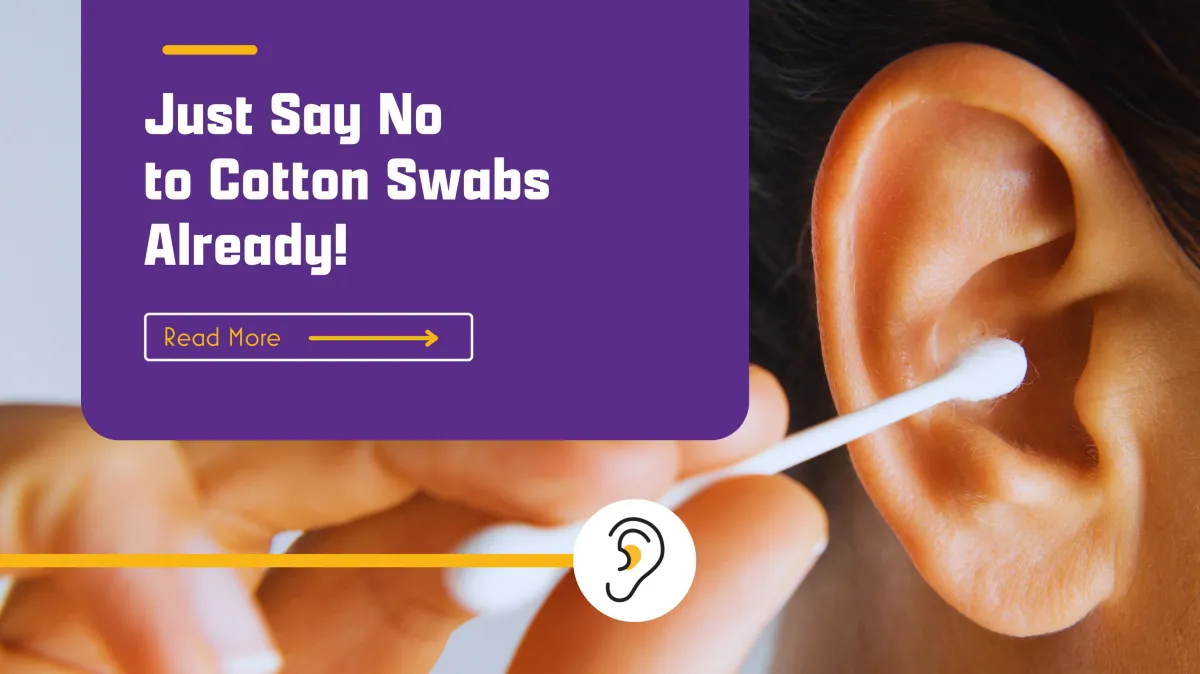
Just Say No to Cotton Swabs Already according to NBC News

🚫❌ Say No to Cotton Swabs Already! 🚫❌
Many thanks to Bethany Heitman and NBC News for featuring Eosera, Inc. in this great article on ear care. Discover safer alternatives to the dreaded cotton swab and tips - like using our Ear Wax MD Cleaning Kit - on how to actually keep your ears healthy.
This article was originally posted on NBC News.
How to safely clean your ears, according to doctors
Just say no to cotton swabs. Doctors warn that using a cotton swab to clean out ear canals can cause irritation and even hearing loss.
June 20, 2024, 2:35 PM CDT By Bethany Heitman
We don’t always have the answers, but we have some people on speed dial who do — which is why we present to you our series FYI where we have experts explain if lip balm is actually bad, how often you should wash your hair and more.
Most body parts are fairly easy to keep clean — just rub on some soap and rinse it off. One area that may feel a little trickier? Your ears. As ear wax accumulates, it may be tempting to stick a cotton swab in your canal to clear it out. But the medical experts we spoke to said that can be dangerous and damage your ear canal.
So, how are you supposed to clean your ears? We asked doctors that exact question. Below, they give tips on the safest way to clean your ears, reveal how often you need to do it and discuss what happens if you don’t keep this part of your body clean. Plus, we rounded up a few ear cleaner recommendations based on their guidance.
What is the best way to clean your ears?
Before diving into how to clean your ears, it’s important to go over techniques you should avoid. “It is advised to avoid placing any items inside the ears, such as cotton swabs, since this can cause damage to the canal or even rupture the thin and delicate tympanic membrane, which can lead to hearing loss,” says Dr. Joaquin Villegas, a family medicine physician at UTHealth Houston. “Cotton swabs can still be used for the cleaning of the outer ear but should not be inserted into the inner ear.” In addition to avoiding cotton swabs, Villegas says you should avoid popular trends like using ear candling and olive oil sprays to clean out wax.
Instead, there are a few other options experts say you can utilize if you feel like wax is building up in your ears. They are:
Use a damp cloth: “This is the safest method for most people,” says Dr. Soma Mandal, a board-certified internist at Summit Health in New Providence, New Jersey. Simply dampen a washcloth with warm water and gently clean the outer part of your ear.” It is important not to try to stick the wash cloth in your inner ear, which could cause irritation.
Try ear drops: Patients clean their ears with cerumenolytic agents, which help loosen ear wax, says Villegas, who notes that there are many over-the-counter options available. Mandal suggests using these drops for a few days and says the wax will soften enough to come out independently.
See a doctor for ear irrigation: If your earwax is built up and impacting your hearing, you may need to see a doctor for help. “A healthcare professional can irrigate the canal, which involves using a syringe to gently pump warm water into the ear,” says Mandal. “The water loosens the earwax, which then drains out with the water.”
How often should you clean your ears?
How often you clean your ears really depends on how quickly cerumen (the medical term for earwax) builds up — it’s different for everyone. “The American Academy of Family Physicians suggests that most people only need to clean their ears every two to four weeks,” says Villegas. “Patients with more cerumen accumulation may sometimes need more frequent cleaning but it should not be a daily occurrence.” Wondering why it’s not a great idea to clean your ears daily? “Too-frequent cleaning can paradoxically lead to higher rates of ear infection since earwax is the body’s natural way of protecting against infections,” adds Villegas.
What happens if you don’t clean your ears?
You know cleaning your ears too frequently is not a great idea, but what happens if you don’t clean them enough? “The biggest risk of not cleaning ears regularly is cerumen impaction, which is partial or complete blockage of the ear canal and can lead to itching, pain and even hearing loss,” says Villegas. In addition, in some cases, excessive earwax can cause dizziness or a sense of the room spinning, says Mandal. If you are experiencing any of these symptoms, it’s best to consult with a doctor.
Ear drops that help you clean your ears
Though doctors we spoke to recommended staying away from cotton swabs when cleaning your ears, they did agree that using ear drops can help get rid of an excess of wax. We used expert guidance to select highly rated drops for you to consider.
Eosera Ear Wax MD Kit
These ear drops contain glycolic acid and sodium bicarbonate to soften and break down ear wax gently. To use, place a few drops in your ear, wait 15 minutes and rinse your ears out with water to wash away the wax. These drops have a 4.0-star average rating from 2,110 reviews on Amazon and is also available on our website.
